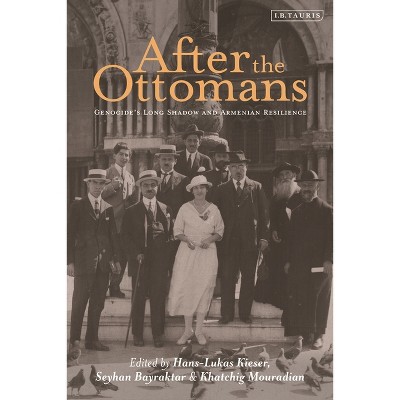Sponsored

Prisoners of Britain - by Panikos Panayi (Paperback)
In Stock
Sponsored
About this item
Highlights
- During the First World War, hundreds of thousands of Germans faced incarceration in hundreds of camps on the British mainland.
- About the Author: Panikos Panayi is Professor of European History at De Montfort University
- 360 Pages
- History, Europe
Description
About the Book
During WWI hundreds of thousands of Germans faced incarceration in hundreds of camps on the British mainland. This is the first book on these German prisoners, and covers 3 different types of internees in Britain: civilians already present in the country in August 1914; civilians brought to Britain from all over the world; and combatants.Book Synopsis
During the First World War, hundreds of thousands of Germans faced incarceration in hundreds of camps on the British mainland. This is the first book on these German prisoners, available in paperback, almost a century after the conflict. The book covers the three different types of internees in Britain in the form of: civilians already present in the country in August 1914; civilians brought to Britain from all over the world; and combatants. Using a vast range of contemporary British and German sources, the volume traces life experiences through initial arrest and capture, to life behind barbed wire, to return to Germany or to the remnants of the ethnically cleansed German community in Britain. The book will prove essential reading for anyone interested in the history of prisoners of war or the First World War and will also appeal to scholars and students of twentieth-century Europe and the human consequences of war.From the Back Cover
During the First World War hundreds of thousands of Germans faced incarceration in hundreds of camps on the British mainland. This is the first book to be published on these German prisoners, almost a century after the conflict. This account concentrates both upon the bureaucratic decision to introduce internment and the consequences of this government policy for individual lives.
The book covers the three different types of male internees who found themselves behind barbed wire in Britain between 1914 and 1919 in the form of: civilians already present in the country in August 1914; civilians brought to Britain from all over the world; and combatants, primarily soldiers from the Western Front, but also naval personnel and a few members of zeppelin crews, whose vessels fell to earth. Using a vast range of contemporary British and German sources, including both the official record and the accounts of numerous internees, the volume traces life experiences through initial arrest and capture to life behind barbed wire to return to a defeated Germany or the remnants of the ethnically cleansed German community in Britain. The study questions the necessity of incarcerating hundreds of thousands of men but places this decision into wider developments in British and European society, bureaucracy and minority persecution. This fascinating volume will prove essential reading for anyone interested in the history of prisoners of war or the First World War and will also appeal to scholars and students of early twentieth century Europe and the human consequences of war.Review Quotes
Panayi's work is more than a long-overdue study of a neglected topic ... By linking wartime internment with the wider history of the persecution and incarceration of minorities, Panayi restates the importance of the war.'
Fiona Reid, BBC History Magazine, 01/05/2013
Reviews in History, July 2013 This thoroughly researched, well-presented book is to be welcomed. 'With this book, Panikos Panayi has produced a valuable contribution to the scholarship growing up around a hitherto neglected corner of World War I. It is well written, clearly organized, and easy to read. Advanced students who pick up Panayi [...] will gain a well-rounded view of the treatment of prisoners and of how that fits into total war narratives of the twentieth century.'
About the Author
Panikos Panayi is Professor of European History at De Montfort UniversityShipping details
Return details
Frequently bought together

Trending Non-Fiction
















